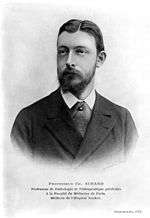Émile Achard

Émile Charles Achard (24 July 1860 – 7 August 1944) was a French internist born in Paris.[1]
In Paris, he served as médecin des hôpitaux (from 1893), later becoming a professor of general pathology and therapeutics. In 1910, he was appointed professor of internal medicine at the University of Paris (Hôpital Beaujon). During his career, he also served as a physician at Hôpital Cochin.

In 1896, along with Raoul Bensaude (1866–1938), he identified a disease he called paratyphoid fever. They were able to isolate the cause of illness to a microbe now classified as salmonella paratyphi B.
A postmenopausal condition known as "diabetic-bearded woman syndrome" is sometimes referred to as "Achard-Thiers syndrome",[2] and the eponymous "Achard syndrome" is a disorder characterized by arachnodactyly, brachycephaly, a receding lower jaw and joint laxity in the extremities.[3]
In 1897, along with internist Joseph Castaigne (1871–1951), he developed a urinary test using methylene blue dye for examining the excretory function of the kidneys. The procedure was to become known as the "Achard-Castaigne test". With Castaigne and Georges Maurice Debove (1845-1920), he published Manuel des maladies du tube digestif.
References
- ↑ La coloproctologie médicochirurgicale: une histoire française…«pour savoir où l'on va, il faut savoir d'où l'on vient» V de Parades - Côlon & rectum, 2011 - Springer "Il collabore notamment avec Émile Achard (1860–1944) sur l'isolement de salmonella paratyphi B et avec Pierre Launois (1856–1914) sur le syndrome de Launois-Bensaude qu'ils décrivent en 1898."
- ↑ National Organization for Rare Disorders, Inc. Achard Thiers Syndrome
- ↑ Achard's syndrome @ Who Named It
|